COVER STORY:
Triumph and Struggle: 2010 Delhi Commonwealth Games
For India, the 2010 Commonwealth Games was a huge opportunity that appeared to have been totally ruined at the outset. To the relief and joy of Indians, however, like a phoenix rising out of ashes, the games were finally hosted with panache and glitz, and the icing on the cake was the unexpectedly strong showing of Indian athletes. Priyanka Bhardwaj offers an assessment.
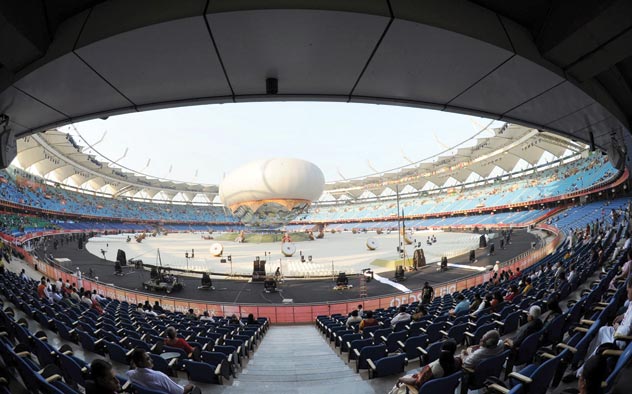
(Above): The inside view of the Jawaharlal Nehru Stadium, the main venue of the inauguration of the 2010 Commonwealth Games in New Delhi, Oct. 3. [PRESS INFORMATION BUREAU photo]
India shrugged off the dire prediction of naysayers with a spectacular closing ceremony of the 19th Commonwealth Games that spanned from Oct. 3-14.
It was a fitting tribute to the bonds of friendship and historical feats set during the games among 71 Commonwealth nations that strove to live up to the ideals of humanity, equality and destiny adopted by the games in 2001.
After more than a few hiccups, India showcased to the world its ability to entertain, host and celebrate a massive sporting extravaganza.
The security was impressive with airport-style scanners and more than 100,000 security personnel deployed.
Feedback from sportspersons like British swimmer Rebecca Adlington, Indian boxer Vijender Singh and Canadian archer Dietmar Trillus highlighted the fact that most thoroughly enjoyed the experience, particularly the culture and world class infrastructure.
Veterans like Milkha Singh described the Games Village at Akshardham as the best he had ever seen.
“Minor hiccups happen everywhere and they should not be given too much of importance. Things should be looked upon in totality and these are super infrastructures created for athletes,” he said.
The run up to the games gave an unflattering view of India at its worst: tales of corruption, mounds of rubble at still-unfinished sites, big delays in completion of infrastructure, collapse of a major footbridge, caving in of a ceiling at the swimming complex, uninhabitable living conditions at the games village, popping up of snakes (yes, you read that right), and grave security concerns.
Games federation president Mike Fennel went on record to say that people repeatedly asked him whether he would cancel the games because of negative media reports.
Even Suresh Kalmadi, chairman of the Delhi organizing committee, was concerned that international teams would withdraw from the games. In fact, some athletes did, including one of the world’s top sprinters, Usain Bolt of Jamaica.
Sponsors were few, and many were not keen to associate with the tainted brand of the 2010 games in the wake of controversy and scandal.
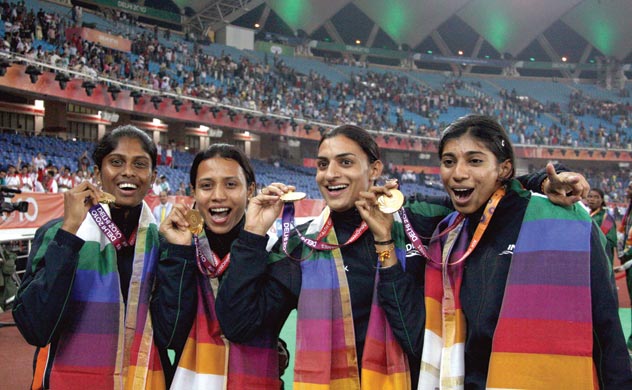
(Above): 2010 Commonwealth Games women’s 4x400m relay gold medal-winning team (l-r): Sini Jose, Mandeep Kaur, Manjeet Kaur and Ashwini Akkunji of India at Jawaharlal Nehru Stadium, in New Delhi, Oct. 12. [PRESS INFORMATION BUREAU photo]
However, as the games proceeded the venues were packed. The closing ceremony transformed Jawaharlal Nehru Stadium into the world’s biggest discotheque.
Vikram Singh, who had been camping in Delhi or the games, said. “I have come from Chandigarh so as to be able to watch it firsthand. And I am glad India has done so well. It has been worth the effort.”
On day one Doordarshan TV, the official telecaster of the event, reported 8.6 million new viewers which scaled up to 34.6 million.
Viewership increased with each passing day as India notched medals. Events that scored the highest viewership were weightlifting, badminton, gymnastics and table tennis.
The Indian medal tally ran up to 38 gold, 27 silver and 36 bronze medals.
Ultimately, the Commonwealth Games provided an opportunity to soak in the varied sporting experiences on offer.
There were Dilliwallahs (belonging to Delhi), visitors, sporting community and leaders who descended upon the capital city to watch and applaud the magnificent exhibition of human physical and mental prowess.
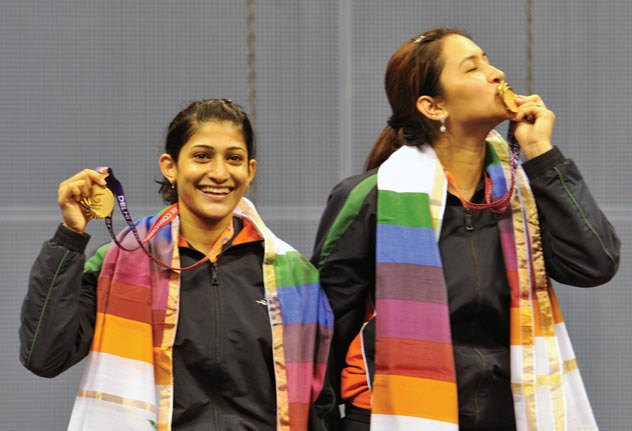
(Above): 2010 Commonwealth Games women’s double badminton gold medal winners (l-r) Jwala Gutta and Machimanda Ashwini Ponnappa of India at Siri fort Sports Complex in New Delhi, Oct. 14. [PRESS INFORMATION BUREAU photo]
Adding to India’s cheer and sense of pride was the 101 medal tally that created a record for Indian sporting achievement in any international arena.
India notched the second place in the medal tally after Australia and was closely followed by England. The fourth and fifth places were grabbed by Canada and South Africa.
Abhinav Bindra, the Indian shooter who began India’s gold medal tally, said, “It’s the changed mindset that ‘We will go for gold’ that’s responsible for India winning so many medals.”
The medal harvest came from shooting, wrestling, archery, boxing, athletics, weightlifting, badminton, table tennis, tennis, gymnastics, hockey and swimming.
Saina Nehwal’s victory at the badminton singles (women’s category) guaranteed that the games ended on a high note for India.
With four gold medals, shooter Gagan Narang won the maximum number of gold medals for India.
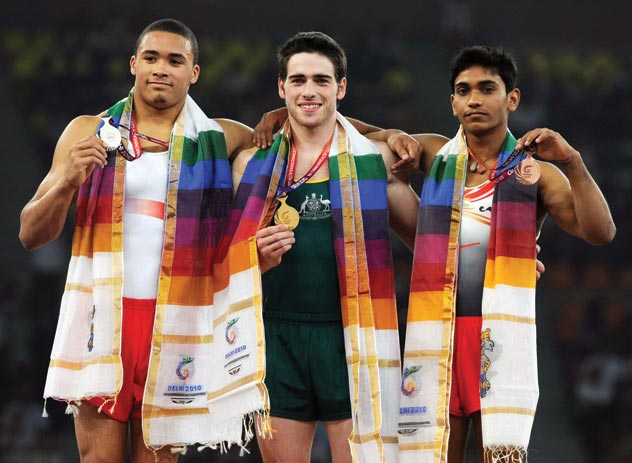
(Above): The 2010 Commonwealth Games artistic gymnastics men’s floor exercise medal winners: Thomas Pichler of Australia (gold), Reiss Beckford of England (silver) and Ashish Kumar of India (bronze) at Indira Gandhi Stadium in New Delhi Oct. 7. [PRESS INFORMATION BUREAU photo]
The stars among the Indian contingent included Saina Nehwal (badminton), Abhinav Bindra, Gagan Narang, Heena Sidhu, Samresh Jung, Annu Raj Singh, Chandrasekhar Kumar Chaudhary (all shooting), Achanta Sharath Kamal, Subhajit Saha (table tennis), Deepika Mahato (archery), Krishna Poonia (discus thrower).
Poonia, a Jat, noted, “Our community is known more for female foeticide. . . but so many Jat women have won medals; it proves what we can do — if we get the opportunity.”
There was also Ashish Kumar who made history by winning the first ever Commonwealth Games medals (silver and bronze) for India in gymnastics.
State governments such as Maharashtra responded offered winners class one jobs as officers and rewarded cash prizes – Rs. 1,000,000 for a gold medal, Rs. 750,000 for a silver and Rs. 500,000 for a bronze.
Indian Prime Minister Manmohan Singh granted a sum of Rs.7 billion to train Indian athletes.
Just as there was a huge hue and cry at the beginning of the Commonwealth Games decrying all that had gone wrong, public opinion appears to swung to the other extreme, with a giddy feeling of euphoria that has overwhelmed any sense of balanced assessment of the games.
The Bollywood-style opening and closing shows at the games can hold its own with the best that Las Vegas has to offer; and it is true that in the end, this very elaborate sporting event was indeed hosted with a minimum of glitches.
That said, basking in the afterglow of a successfully hosted games is a poor substitute for some levelheaded stocktaking that is essential if India is to learn from its experience of hosting a major international sporting event.

(Above): 2010 Commonwealth Games men’s cycling gold medal winners (l-r): Bobridge Jack, Hepburn Michael, Meyer Cameron and Parker Dale of Australia at the Indira Gandhi Sports Complex in New Delhi, Oct. 7. [PRESS INFORMATION BUREAU photo]
And one does not wish to be churlish — let’s give credit where credit is not only due, but overdue.
So a profound debt of gratitude must be acknowledged to the most unsung of India’s heroes—its athletes. The extremely unpleasant fact remains that barring a handful of sports like cricket and golf, Indian sportspersons are woefully underpaid. The power rests with professional politicians who have cozy sinecures in India’s sporting establishment — think Suresh Kalmadi, the much-maligned big honcho on the Indian side of the Delhi games.
Yet the golden boys and girls of India showed the nation—and the world—what they are capable of. Typical was the stirring victory of the Indian quartet of Sini Jose, Mandeep Kaur, Manjeet Kaur and Ashwini Akkunji: These athletes went on to win the gold medal in the 4x400m relay, to the thunderous cheering of an ecstatic crowd.
Even on the organizational side, despite the well publicized pitfalls, the successful hosting of such an elaborate sporting event does deserve praise. Over 6,000 athletes from 71 nations participated, so this was no joke.
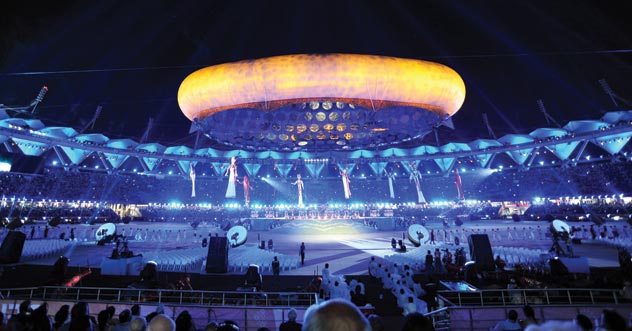
(Above): Giant puppets hang from the aerostat during the opening ceremony of the 2010 Commonwealth Games in New Delhi, Oct. 3. [PRESS INFORMATION BUREAU photo]
However, notwithstanding the success, India must not forget the bigger global picture. In the international arena, as a dynamic, emerging economy, India likes to be compared to the other Asian powerhouse, China. Here, one realizes how far India has to go. China’s recent hosting of the Beijing Olympics stunned even the Western world. It already has the facilities ready for the upcoming Asian Games.
The motto of the Olympics, which is a code for athletes around the world, emphasizes participation. The important thing in the Olympics, goes the motto, is not to win but to take part, just as in life the important thing is not the triumph but the struggle.
For India, the 2010 Commonwealth Games brought a taste of both triumph and struggle, and it will benefit most if can draw the right lessons from it.
|